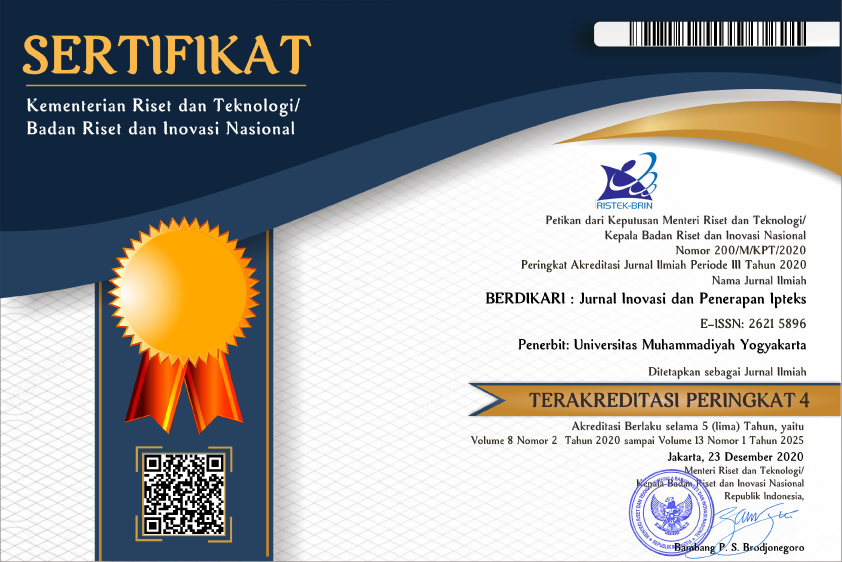Pemanfaatan Aplikasi Pembelajaran Bahasa Inggris Duolingo dan Busuu Menggunakan Media Smartphone
Abstract
The current community service aims at socializing and introducing how Duolingo and Busuu applications were used in English learning. This activity was undertaken in a Junior High School at the border area between Indonesia and Timor Leste, SMPN Napan grade IXA. The problem to be addressed in this activity was the absence on the use of English applications to support the learning. This fact was supported by observation result in which the English learning focus only on the use of some textbooks. The method comprises 3 stages: informing how to operate Duolingo and Busuu applications to the students, executing the English learning process supported by Duolingo and Busuu applications, and checking the students’ understanding on the use of both applications. The outcome of the community service pinpointed that the students were very enthusiastic when they operated those applications. Moreover, the interesting design of those applications encouraged the students to complete exercises in the applications. The class atmosphere was becoming more alive even though the learning process was done at noon or in the afternoon.
Keywords
Full Text:
PDFReferences
Alhafeez Ali Ta’amneh, M. A. (2021). The use of smartphones in learning English language skills: A study of university students’ perspectives. International Journal of Applied Linguistics and English Literature, 10(1), 1. https://doi.org/10.7575/aiac.ijalel.v.10n.1p.1
Ambarwati, R., & Mandasari, B. (2020). The influence of online Cambridge dictionary toward students’ pronunciation and vocabulary mastery. Journal of English Language Teaching and Learning, 1(2), 50–55. https://doi.org/10.33365/jeltl.v1i2.605
Arianto, P. (2021). Teaching English during Covid-19 pandemic : using “ Busuu ” in speaking class. UNNES-TEFLIN National Seminar, 392–401.
Citrayasa, V. (2019). Junior High School students’ lived experiences of learning English using Busuu. Indonesian EFL Journal, 5(2), 85–92. https://doi.org/10.25134/ieflj.v5i2.1900
Damronglaohapan, S., & Stevenson, E. (2013). Enhancing listening skills through movie clips on YouTube. ECTC2013 Official Conference Proceedings, 1–25. Retrieved from www.iafor.org
Fageeh, A. I. (2014). Effects of using the online dictionary for etymological analysis on vocabulary development in EFL college students. Theory and Practice in Language Studies, 4(5), 883–890. https://doi.org/10.4304/tpls.4.5.883-890
Gangaiamaran, R., & Pasupathi, M. (2017). Review on use of mobile apps for language learning. International Journal of Applied Engineering Research, 12(21), 11242–11251. Retrieved from http://www.ripublication.com/ijaer17/ijaerv12n21_102.pdf
Huda, N. (2020). Penerapan metode tanya jawab sebagai upaya meningkatkan keaktifan siswa pada mata pelajaran Fiqih Kelas X Ipa 3 Ma Darussalam Krempyang Tanjunganom Nganjuk. Jurnal El-Barqie: Jurnal MA Darussalam, 1(1), 141–162. Retrieved from https://pondokkrempyang.org/wp-content/uploads/2020/07/ARTIKEL-08-EL-BARQIE-1.pdf
Lekawael, R. F. J. (2017). The impact of smartphone and internet usage on English language learning. English Review: Journal of English Education, 5(2), 255–262. https://doi.org/10.25134/erjee.v5i2.540
Mengjie, L., Noordin, N., Ismail, L., Aira, N., Rahim, A., Zaremohzzabieh, Z., … Priya, J. (2021). The role of smartphone applications as English learning tool among Chinese University Students. Turkish Journal of Computer and Mathematics Education, 12(14), 385–398.
Metruk, R. (2020). EFL learners’ perspectives on the use of smartphones in higher education settings in Slovakia. Electronic Journal of E-Learning, 18(6), 537–549. https://doi.org/10.34190/JEL.18.6.006
Mulya, A., & Refnaldi. (2016). Teaching using School.Duolingo.com as an alternative E-Learning at Senior High School for teaching and learning English online. Journal of English Language Teaching, 5(1), 287–296. Retrieved from http://ejournal.unp.ac.id/index.php/jelt
Muntaha, M. (2017). Peran penggunaan smartphone dalam belajar bahasa Inggris pada mahasiswa jurusan Pendidikan Bahasa Inggris IAIN Surakarta. ResearchGate, 1–31. https://doi.org/10.13140/RG.2.2.11334.52809
Nofrika, I. (2019). EFL Students’ Voices: The Role of YouTube in developing English competences. Journal of Foreign Languange Teaching and Learning, 4(1). https://doi.org/10.18196/ftl.4138
Prijanto, J. H., & Kock, F. De. (2021). Peran guru dalam upaya meningkatkan keaktifan siswa dengan menerapkan metode tanya jawab pada pembelajaran online. Scholaria: Jurnal Pendidikan Dan Kebudayaan, 11(3), 238–251. Retrieved from https://ejournal.uksw.edu/scholaria/article/view/4318
Putri, L. M., & Islamiati, A. (2018). Teaching listening using Duolingo application. PROJECT (Professional Journal of English Education), 1(4), 486. https://doi.org/10.22460/project.v1i4.p486-491
Rohmawati, S. (2018). Penerapan metode tanya jawab untuk meningkatkan prestasi belajar Pendidikan Agama Islam pada siswa SMP. Jurnal Pendidikan: Riset & Konseptual, 2(1), 64. Retrieved from http://journal.unublitar.ac.id/pendidikan/index.php/Riset_Konseptual
Tananuraksakul, N. (2015). The effect of online dictionaries usage on EFL undergraduate students’ autonomy. Teaching English with Technology, 15(4), 3–15. Retrieved from https://bibliotekanauki.pl/articles/955864
Tiara, A. D., Rahman, M. A., & Handrianto, C. (2021). The students’ perception about use of Duolingo application for improving English vocabulary. International Journal of Education, Information Technology and Others (IJEIT), 4(4), 690–701. https://doi.org/10.5281/zenodo.5775915
Winans, M. D. (2020). Busuu: A social network application to learn languages. CALICO Journal, 37(1), 117–126. https://doi.org/10.1558/cj.37781
DOI: https://doi.org/10.18196/berdikari.v12i2.22096
Refbacks
- There are currently no refbacks.

This work is licensed under a Creative Commons Attribution 4.0 International License.
__________________________________________________________________
Contact us: BERDIKARI : Jurnal Inovasi dan Penerapan Ipteks, Address: Gedung D, LP3M UMY, Alamat: Jl. Brawijaya, Tamantirto, Kec. Kasihan, Bantul, Daerah Istimewa Yogyakarta 55183. Email: berdikari@umy.ac.id

Ciptaan disebarluaskan di bawah Lisensi Creative Commons Atribusi 4.0 Internasional.



